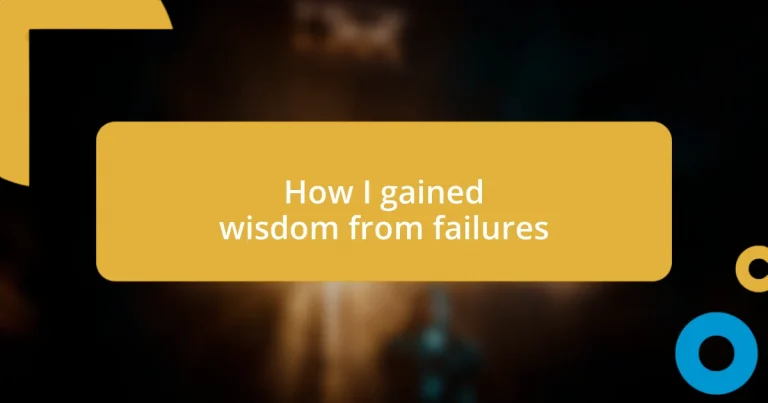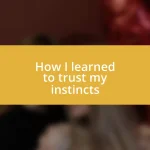Key takeaways:
- Failure is a crucial learning tool that fosters personal growth and empathy, prompting reevaluation of skills and priorities.
- Embracing a growth mindset encourages seeking feedback and reflection, transforming setbacks into opportunities for improvement and resilience.
- Applying lessons from past mistakes, such as enhancing communication and implementing systematic practices, is essential for navigating future challenges.
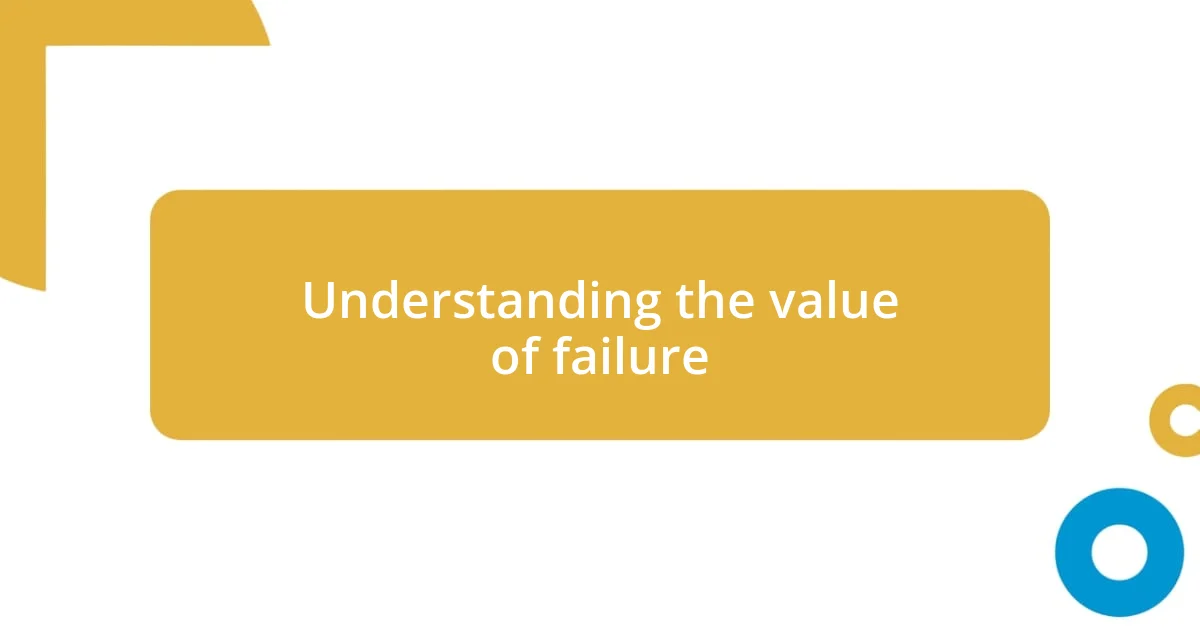
Understanding the value of failure
Failure often feels like a heavy burden, but in my experience, it serves as an invaluable teacher. I remember one particular time when I missed a significant deadline on a project. At that moment, I was crushed, feeling like I’d let everyone down. Yet, looking back, that setback forced me to reassess my time management skills and prioritize tasks more effectively. How often do we overlook such opportunities for growth when we’re consumed by our disappointments?
The emotional sting of failure can also deepen our empathy for others. When I struggled through a failed business venture, I learned to connect more authentically with others facing tough times. It made me realize that sharing our stories, including our failures, fosters a supportive community. Have you ever stopped to consider how your own experiences can uplift someone else?
Understanding the value of failure is about embracing vulnerability and finding courage in our shortcomings. I’ve learned to celebrate small failures, as they remind me that risk-taking is a part of growth. Each stumble along my journey has revealed vital lessons and helped shape the person I am today. What lessons can you uncover from your own setbacks?
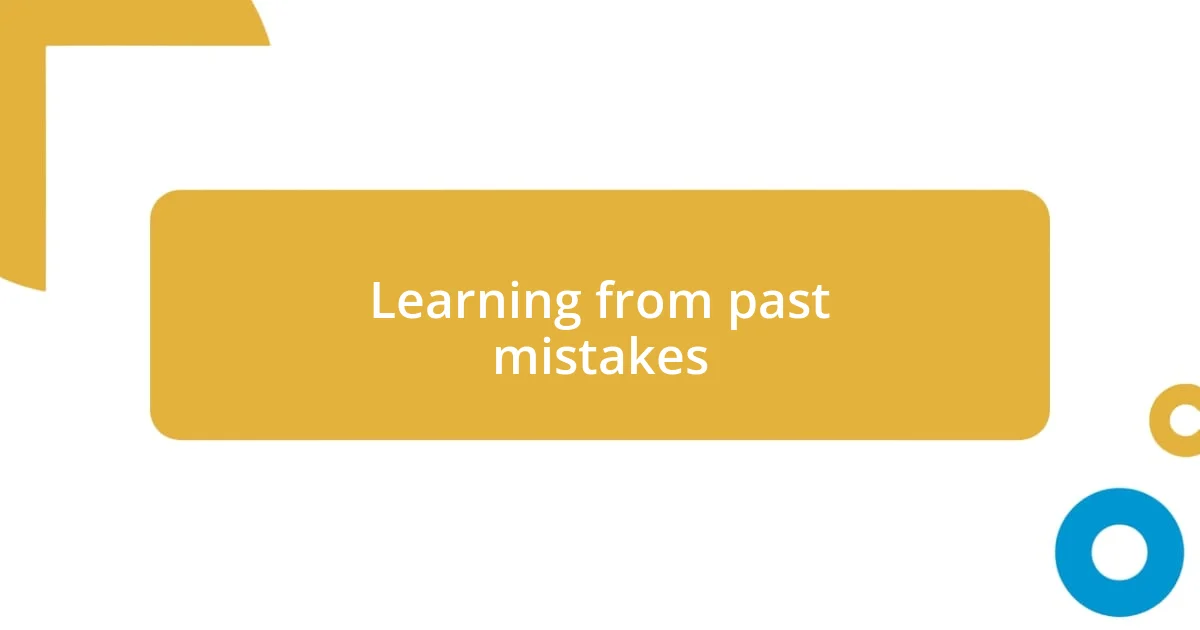
Learning from past mistakes
Learning from past mistakes is not just about acknowledging failure; it’s about digging deep into its lessons. I recall a time when I did poorly in a public speaking competition. Instead of viewing it as a disaster, I reflected on what went wrong. Analyzing my nerves and preparation helped me realize the importance of practice and self-confidence. That experience transformed my approach, leading me to join a local speaking club where I honed my skills. The evolution from failure to growth can be truly empowering!
Another vivid memory I have is from a partnership that didn’t pan out. Initially, I felt betrayed by my colleague’s lack of commitment, which stung deeply. However, upon reflection, I recognized my part in assuming too much responsibility. It taught me the value of communication and setting clear expectations. Now, whenever I collaborate with others, I emphasize open dialogue, ensuring everyone is on the same page. This shift not only enhances my teamwork but fosters mutual respect.
In my journey, I’ve discovered that each mistake can be a stepping stone to success. During one chaotic project, my team faced a critical error due to my oversight. While the aftermath was stressful, it ignited a passion in me to create better systems. I developed a checklist process, which not only saved us future headaches but inspired others to adopt similar practices. I believe that embracing these moments equips us with the resilience we need for future challenges. What processes might you innovate from your own missteps?
| Type of Mistake | Lesson Learned |
|---|---|
| Public Speaking Failure | Importance of Practice and Confidence |
| Partnership Breakdown | Value of Communication and Expectations |
| Project Oversight | Need for Better Systems and Checklists |
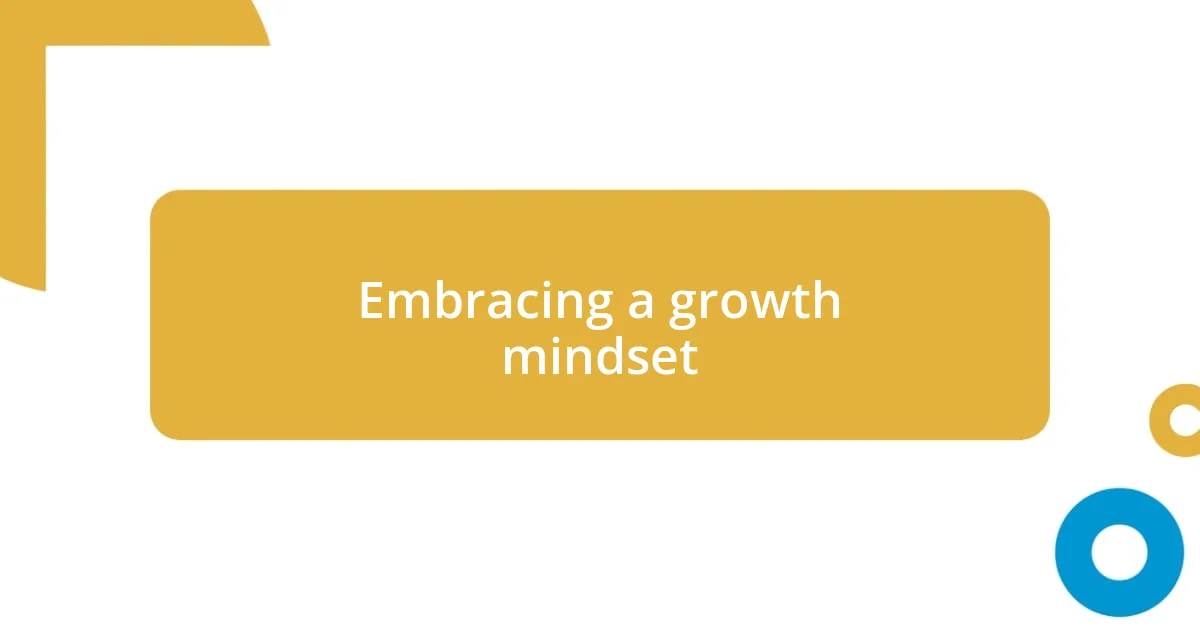
Embracing a growth mindset
I’ve come to realize that embracing a growth mindset is essential to navigating life’s challenges. It’s about seeing failures not as dead ends but as stepping stones towards improvement. For instance, I once approached a new job with the mindset that I had to prove myself immediately. When I didn’t grasp everything on my first try, I felt disheartened. Yet, this experience nudged me to adopt a more open attitude toward learning. I started seeking feedback regularly, which shifted my perspective entirely. Rather than hiding my mistakes, I invited insights from colleagues. This not only deepened my understanding but also fostered stronger relationships, built on shared growth.
- Be open to feedback: Actively ask for input, and embrace constructive criticism as a tool for growth.
- Reflect on experiences: Consider what each failure teaches you and how it contributes to your development.
- Cultivate resilience: Recognize that challenges are opportunities for building strength and adaptability.
- Celebrate small victories: Acknowledge minor successes along the way, as they pave the path to larger achievements.
I vividly remember the time I attempted to launch a blog, initially filled with excitement. When I barely attracted any readers, disappointment weighed heavily on me. Instead of giving up, I explored why my content wasn’t resonating. Engaging with my audience through surveys revealed that I wasn’t addressing their interests effectively. This realization sparked not only a content overhaul but also a much-needed connection with my audience. That shift turned my blog into a dialogue, not just a monologue. Embracing a growth mindset meant transforming that flop into a vibrant community, showcasing the true power of learning and adaptation.
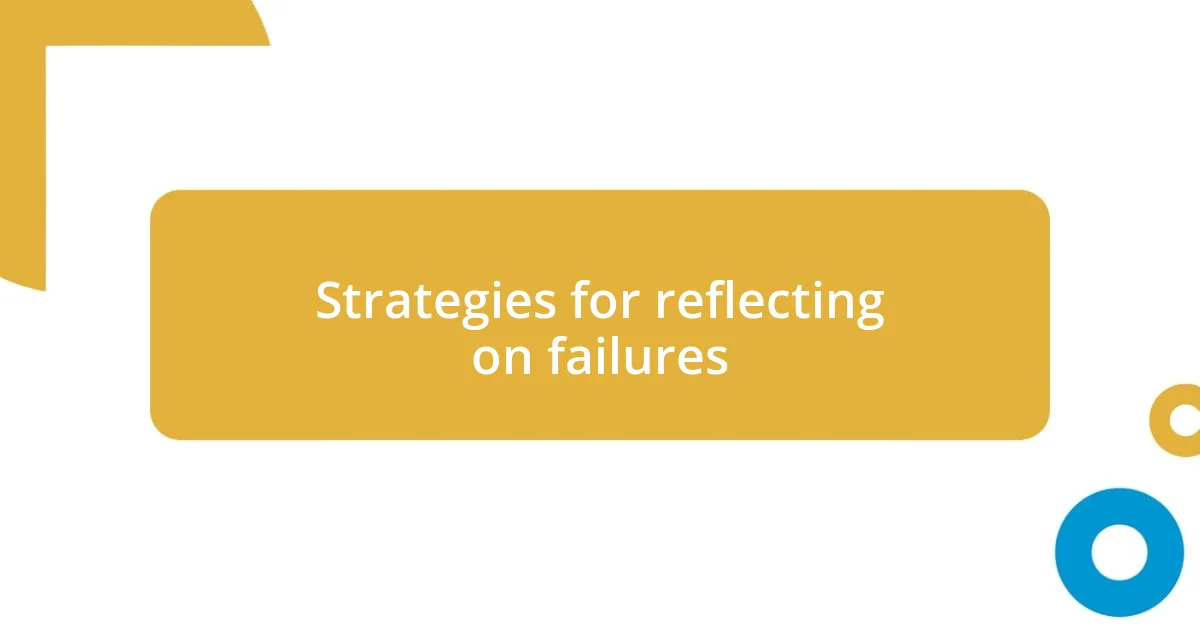
Strategies for reflecting on failures
Reflecting on failures requires intentional strategies that can transform those experiences into valuable lessons. One method I find particularly effective is journaling my thoughts and feelings after a setback. This practice allows me to dissect the emotions involved and articulate what went wrong. For example, after missing a deadline that stressed my entire team, I poured my heart into my journal, not just detailing the event but also my frustrations about letting everyone down. By capturing these reflections, I slowly uncovered patterns in my time management that needed addressing.
Another approach that has significantly helped me is discussing my failures with mentors or trusted peers. I remember a moment when I bombed an important presentation. Seeking feedback from a mentor not only eased the sting but also provided me with fresh perspectives on my delivery style. Together, we explored why my message fell flat, and I welcomed their insights, which taught me the importance of audience engagement. Have you ever reframed a setback by opening up to someone else? If so, you likely experienced the power of collective wisdom.
Finally, I’ve learned to celebrate my insights that come from these failures, no matter how small. For instance, after losing a client because of miscommunication, I didn’t just mourn the loss; I celebrated my newfound understanding of the importance of clarity in my communications. I now cherish those moments that teach me resilience, recognizing that every failure bears the potential for growth. How might embracing such insights change the way you approach your own challenges?
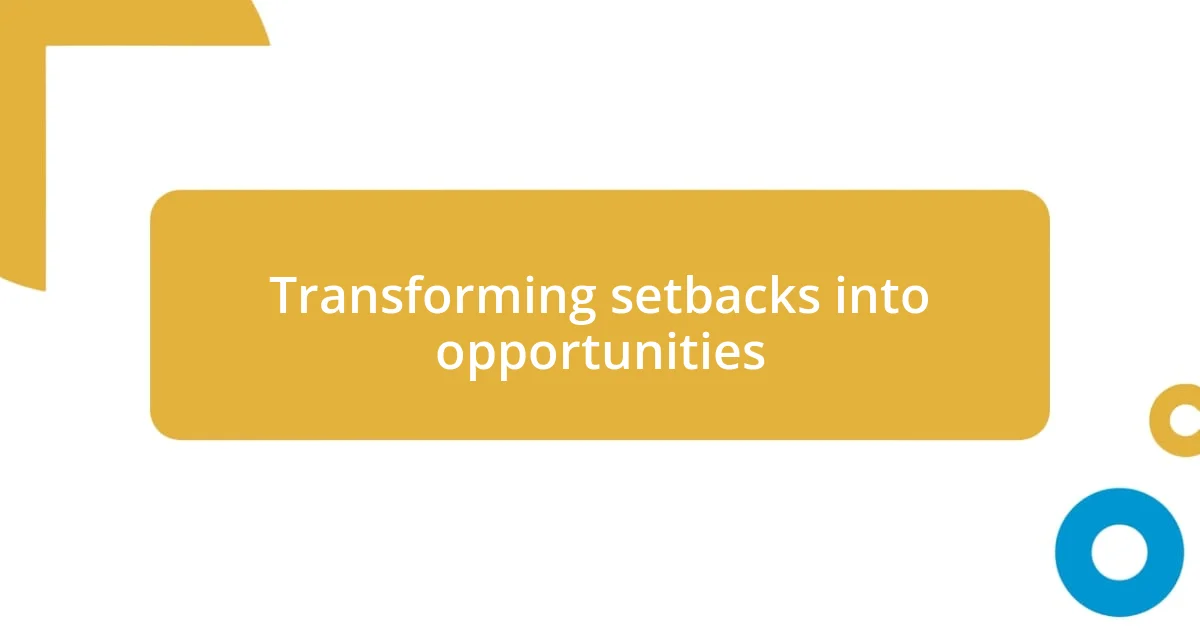
Transforming setbacks into opportunities
It’s remarkable how a setback can shift my focus toward new possibilities. I recall a time when I fell short in a project presentation. Initially, it felt like a huge defeat, but it triggered me to analyze my approach. Instead of sulking, I delved into why it didn’t resonate. I realized that I wasn’t addressing the audience’s needs. This exploration not only refocused my efforts, but it also enriched my future presentations. Have you ever noticed how a seemingly negative experience can lead to a deeper understanding?
Embracing setbacks as opportunities often means stepping into uncomfortable territory. I distinctly remember my first failed attempt at leading a team. Instead of seeing it as a dead end, I embraced the chaos. I sought candid conversations with team members, understanding their frustrations could unveil new strategies. I was surprised by how much this collective reflection not only improved my leadership skills but also strengthened team cohesion. Can you think of a time when embracing discomfort led to unexpected growth?
When I think about transforming setbacks, celebrating those lessons has become a pivotal part of my journey. After facing harsh criticism on a project, I felt crushed initially. However, I decided to celebrate the feedback as a gift. That shift in mindset allowed me to cultivate resilience and recognize patterns I previously overlooked. It taught me that every setback could reveal areas for growth, making the path forward clearer. Do you often take time to acknowledge the lessons hidden in your failures?
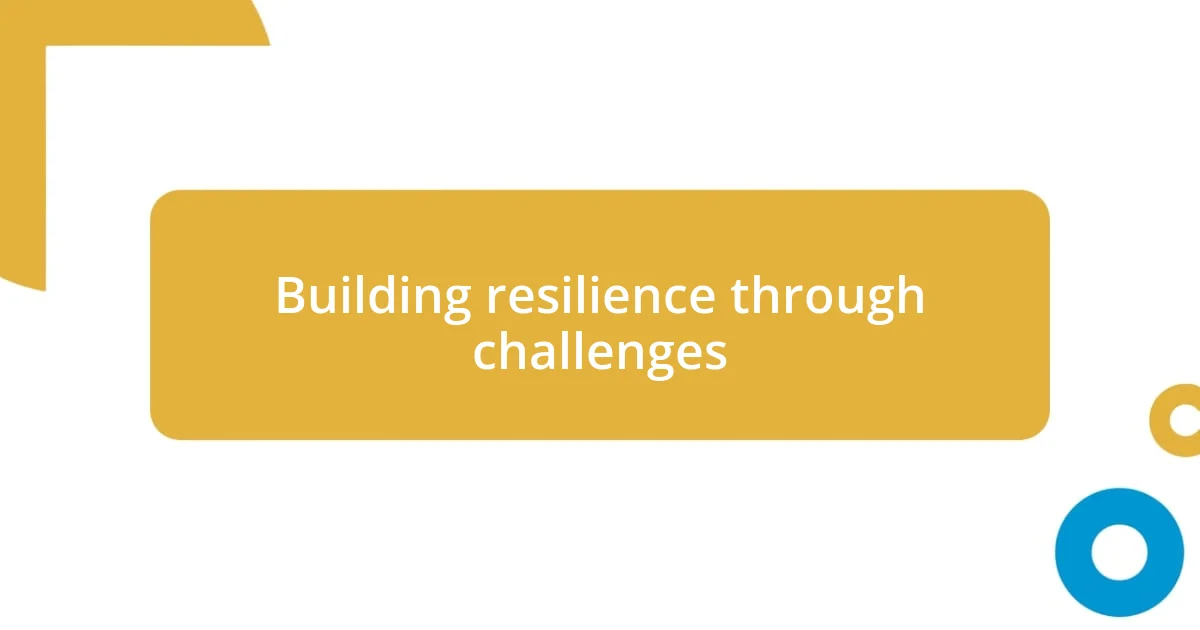
Building resilience through challenges
Building resilience through challenges is a journey I deeply relate to. I remember a particularly tough moment when I lost a significant client due to overlooked details. At first, the defeat felt crushing, but as I processed the experience, I uncovered layers of resilience within myself. It was as if each challenge was a weightlifting session for my spirit; it hurt, but ultimately strengthened me. Have you ever felt that small surge of power when you push through a setback?
Through each challenge, I’ve found that my fears often disguise valuable lessons waiting to be uncovered. There was a time when I hesitated to pursue a promotion because I doubted my capabilities. After some soul-searching—and a few friendly nudges—I decided to take the leap. The pressure was intense, but standing on that precipice of fear taught me that resilience grows when we face our uncertainties head-on. Can you think of an instance when stepping outside your comfort zone led to unexpected rewards?
I’ve also seen how sharing my challenges with others enriches my resilience. I recall a time when I felt overwhelmed by balancing responsibilities while pursuing personal growth. In a candid chat with a friend, I realized I wasn’t alone in feeling stretched thin. That conversation not only lightened my load but also made me appreciate the importance of community in building resilience. It’s fascinating how vulnerability can pave the way for strength, right?
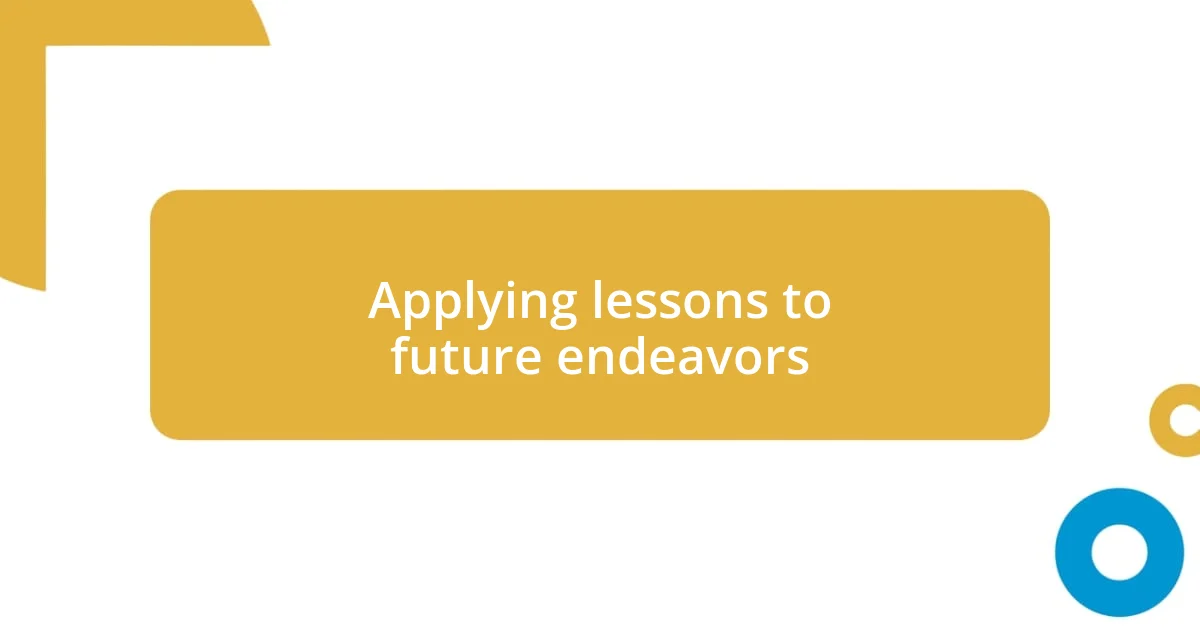
Applying lessons to future endeavors
The real magic happens when I take the lessons learned from past failures and apply them directly to new projects. I remember launching a product that didn’t meet market expectations. Reflecting on that experience, I realized I had ignored critical customer feedback. Since then, I’ve made it a point to actively seek input from potential users before even beginning the development phase. This shift has transformed how I approach new initiatives, and it’s made me much more insightful. Have you ever adjusted your strategy after a setback?
Applying these lessons often requires a mindset shift, and I’ve come to see every stumble as a stepping stone. After missing a crucial deadline, I started using project management tools, which seemed tedious at first. Yet, they turned out to be invaluable. The clarity they provide keeps me organized, ensuring I never drop the ball again. I now view setbacks as hints, guiding me towards better practices. Isn’t it interesting how one experience can lead to such practical adaptations?
Moreover, I’ve recognized the importance of building a support network that encourages learning from failures. I often reach out to mentors who have faced similar hurdles. Sharing these experiences allows us to compare notes, turning what could be a solitary struggle into a collective wisdom. During one of those discussions, I was inspired to experiment with a new approach to public speaking that I had previously shied away from. Can you think of someone in your life who has helped you reshape your viewpoint after a setback?












